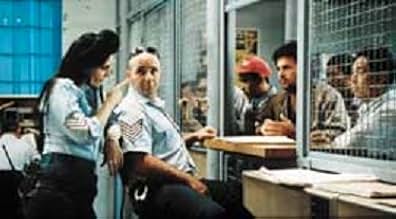Adicionar um enredo no seu idiomaSlice-of-life look at the lives of twelve people who live or work in the same apartment complex in Tel Aviv.Slice-of-life look at the lives of twelve people who live or work in the same apartment complex in Tel Aviv.Slice-of-life look at the lives of twelve people who live or work in the same apartment complex in Tel Aviv.
- Direção
- Roteiristas
- Artistas
- Prêmios
- 4 indicações no total
Hana Laslo
- Mali
- (as Hana Laszlo)
Uri Klauzner
- Ezra
- (as Uri Ran Klauzner)
- Direção
- Roteiristas
- Elenco e equipe completos
- Produção, bilheteria e muito mais no IMDbPro
Avaliações em destaque
This movie was just pointless and more importantly - boring. The director had the goods he needed to make a great film. But when he actually narrated the beginning as to who worked on the film, "I'm like, are you serious?" I only saw this Israeli film because I wanted to see Ronit Elkabetz and she blew away the scenes she was in but overall, her appearance was much too brief. She is such an awesome actress, I re-watched 'Late Marriage'. Then her character's denouement in this film was the nail in the coffin for me. I fast forwarded through most of this cinematic wreck. I also recommend 'The Band's Visit' with again Ronit because this had to be an embarrassment to everyone who worked on this production.
This is a fresh canvas over daily life in modern Israel depicted by several stories that intertwine within a chaotic apartment building where the main characters dwell. The plot of the movie is not exactly straightforward, but this a well-known feature in Gitai's films. Gitai is a keen observer of life in Israel, and that is what the film is all about. In this sense, the movie outstandingly captures the mayhem and chaos of life in southern Tel-Aviv through the stories of ordinary people. But, however absorbed they seem to be in their own problems and plights, they cannot detach themselves from "the situation", the euphemism Israelis use to denote the conflict with the Arabs. Thus, the personal troubles of the main characters are put into perspective when confronted with the larger picture of bombings and terrorism, as radio flashes remind the main characters what is going on in the outside world. Nevertheless, unless you appreciate all things Israeli, you won't find any particular appeal in this movie. This is definitely not a mainstream movie, although all actors perform remarkably well. Also, you have to be a native Hebrew speaker or you won't understand most of it. I could hardly understand 10% of the dialogs. Additionaly, some Oriental Mizrahi music in the background also adds up to raise the interest of the movie.
"Alila" is a snail-paced series of vignettes about life in one Tel Aviv neighborhood. The film features roughly a half dozen stories playing out simultaneously, most of them focused on a single apartment building and the people who live and work there. Gabi is a young woman who's having an affair with an older married man named Hezi, who has set her up in her own little unit in the complex where he comes to visit her periodically for passionate sexual encounters. The second major plot strand involves Ezra, a building contractor, who is helping to add what may be a possibly illegal wing onto the building. Ezra, who lives in the van he uses for work, has an ex-wife whom he still loves and can't seem to leave alone, as well as a teenaged son who has gone AWOL from the Israeli army because he doesn't believe in the cause for which the military - and, by extension, the nation - is fighting. There are several other plot strands running throughout the film, but these two are the most prominent and, in the second case at least, the most compelling.
If writer/director Amos Gitai had managed to pick up the pace a bit and brought a little more cohesiveness to the narrative, "Alila" might have been an interesting little movie. The tale involving the young boy and his divorced parents is, by far, the most intriguing, and one wishes that Gitai had simply made the film about that storyline and jettisoned the rest. The part dealing with Gabi and Hezi is not only hackneyed and dull, but involves a change of heart on the part of Gabi that is so arbitrary and poorly prepared for that it seems as if large chunks of the film had inadvertently tumbled onto the cutting room floor and been swept out with the trash. One character in the film even has the incisiveness to analogize Gabi's life to the infamously bad soap opera "Back Street" - and how right she is! Apparently the filmmakers were incapable of perceiving and acting upon the astute self-criticism inherent in the comment. The other stories are even more dull and uninteresting - although, mercifully, they take up far less running time than this one. The film touches ever so lightly on such topics as the tensions between Arab and Jew, and the problems of illegal immigrants in the country, but neither issue gets much in-depth analysis from the filmmakers.
The acting is good, especially in the one episode that really counts, but even that isn't enough to pump some badly needed life into the film. "Alila" meanders down its long and monotonous path, only to wind up pretty much where it started at the beginning.
If writer/director Amos Gitai had managed to pick up the pace a bit and brought a little more cohesiveness to the narrative, "Alila" might have been an interesting little movie. The tale involving the young boy and his divorced parents is, by far, the most intriguing, and one wishes that Gitai had simply made the film about that storyline and jettisoned the rest. The part dealing with Gabi and Hezi is not only hackneyed and dull, but involves a change of heart on the part of Gabi that is so arbitrary and poorly prepared for that it seems as if large chunks of the film had inadvertently tumbled onto the cutting room floor and been swept out with the trash. One character in the film even has the incisiveness to analogize Gabi's life to the infamously bad soap opera "Back Street" - and how right she is! Apparently the filmmakers were incapable of perceiving and acting upon the astute self-criticism inherent in the comment. The other stories are even more dull and uninteresting - although, mercifully, they take up far less running time than this one. The film touches ever so lightly on such topics as the tensions between Arab and Jew, and the problems of illegal immigrants in the country, but neither issue gets much in-depth analysis from the filmmakers.
The acting is good, especially in the one episode that really counts, but even that isn't enough to pump some badly needed life into the film. "Alila" meanders down its long and monotonous path, only to wind up pretty much where it started at the beginning.
OK, not all the acting was top-notch. Or maybe not understanding much Hebrew deprived me of some of the subtext (especially the policewoman). But a plot with little motion is very hard pull off successfully. And I think Gitai succeeds wonderfully. The plot in our lives usually moves no faster than this. Does that mean our lives are without meaning? I was five years old when I was in Tel-Aviv, and I remember it being beautiful and modern. This was a bit of a shock for me. But this is actually life almost everywhere, even in the US. Politics is mentioned only peripherally, leaving us to ponder on the actual lives of individuals. The people are real, and politics is still there and does affect people, no matter how much you want to ignore it. But the movie is still about people. And this is a beautiful portrayal of their lives. Every character has some sort of frustrated passion. I recommend this movie.
I'd like see someone from Israel comment on the policewoman. She has an unusual way of talking, a strange hairdo, and some important story significance. Does she represent a stereotype of an anti-Arab? Or is there some other comment the author wants to make?
I'd like see someone from Israel comment on the policewoman. She has an unusual way of talking, a strange hairdo, and some important story significance. Does she represent a stereotype of an anti-Arab? Or is there some other comment the author wants to make?
Inevitably perhaps for a contemporary Israeli film, the ongoing conflict between Israelis and Palestinians looms over the lives of Alila's protagonists: in the film's opening scene, one of the main characters - a man of 18 or 19 - is on his way to an army barracks; several times during the film we overhear reports of suicide attacks on a radio in the background. But for most of the film, we're more occupied with the personal lives of the protagonists, whose problems (why do I keep seeing this person? why doesn't my ex-spouse just leave me alone?) are more universal.
And, on the whole, these people's lives keep us reasonably well entertained for 2 hours. They're an interesting enough bunch and the cast is consistently strong. But for me, the film is ultimately let down by its script: the dialogues are flat at times, the protagonists rarely get the chance to show more than one side of their character, and - despite showing us all manner of human folly - the tone is a bit heavy side. A film worth seeing, but no masterpiece.
And, on the whole, these people's lives keep us reasonably well entertained for 2 hours. They're an interesting enough bunch and the cast is consistently strong. But for me, the film is ultimately let down by its script: the dialogues are flat at times, the protagonists rarely get the chance to show more than one side of their character, and - despite showing us all manner of human folly - the tone is a bit heavy side. A film worth seeing, but no masterpiece.
Você sabia?
- Cenas durante ou pós-créditosOpening credits are spoken by director Amos Gitai.
Principais escolhas
Faça login para avaliar e ver a lista de recomendações personalizadas
- How long is Alila?Fornecido pela Alexa
Detalhes
Bilheteria
- Faturamento bruto nos EUA e Canadá
- US$ 50.961
- Fim de semana de estreia nos EUA e Canadá
- US$ 3.063
- 29 de fev. de 2004
- Faturamento bruto mundial
- US$ 193.385
- Tempo de duração2 horas 3 minutos
- Cor
- Mixagem de som
- Proporção
- 1.85 : 1
Contribua para esta página
Sugerir uma alteração ou adicionar conteúdo ausente



























